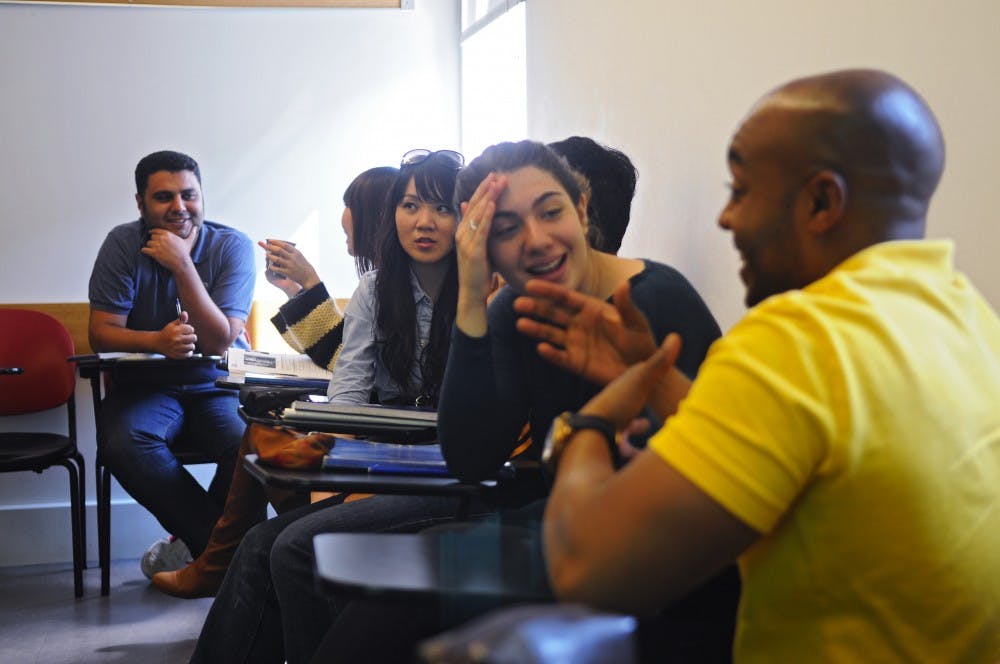
Yvonne Wang, 17, may only have been in the United States for six months, but she can hold her own in an English conversation.
Wang is just one of about 2,000 international students enrolled in Penn’s English Language Programs, a set of intensive programs for people from abroad who want to learn English. During their stay at Penn, students are enrolled in the program but are not officially affiliated with a school at Penn.
The ELPs break down into more tailored programs, like University Connection, which targets people who are looking at undergraduate or postgraduate degrees in English-speaking countries, or the International Business Communication Program, another program that focuses on teaching English to business professionals.
Approximately 1,800 to 2,000 students are taken into the program every year, from over 20 different countries.
“There has been an increasing number of students in their gap years who come because they’re trying to apply for universities in the U.S.,” said ELP Associate Director of Business Development Sharon Kim.
An intensive ELP core consists of eight separate seven-week sessions, with courses for beginners in reading, writing, listening and speaking, up to more integrated skills such as advanced academic writing. Students can stay for as many seven-week sessions as they want.
“We do have a high retention rate,” said Jack Sullivan, the manager of the Intensive and General English Programs. “Most students are here for academic purposes. They have specific goals that they want to achieve before they leave.”
Kim agreed, saying that the program has a pretty strong track record. Several UniConn students have gone on to apply to MIT and Duke, in addition to Penn.
Wang came to the ELP at Penn fresh out of high school because she would like to apply to American universities next year. Penn appeals to her because of its diverse student body and the range of student activities available on campus.
She is already very involved in two clubs: The Chinese Music Society and the International Affairs Association.
“The Chinese Music Society I got involved with from the student organization fair on Locust Walk,” she said. “I like music, [and] it was a good way to meet Chinese-American students.”
And since Wang participated in Model United Nations in China, she is able to continue with it through the IAA at Penn.
Likewise, Yemi Kacoutie, 18, from the Ivory Coast, started her program in September last year. She came to Penn for the UniConn program because she wants to study in the United States.
“I must admit, in the beginning many of my friends were French-speaking, but they all left, and I met a lot of people and learned things I didn’t know before,” she said. From her fellow ELP classmates, Kacoutie has also picked up phrases in Spanish, Turkish and a few other languages.
The two girls are both in their fourth and last sessions with the ELP, and both intend to go to college in the U.S.
Kacoutie is currently waiting for her application results from various American universities, including Penn, UCLA, Berkeley and Northwestern, while Wang is planning on going back to China before coming back to attend college in the fall.
Another major part of the ELP is their Conversation Partner Program, which pairs an ELP student with a local Penn student learning their respective language.
“We’ll have some activities, such as the partners speaking for half an hour in English and then half an hour in their other language,” Kim explained. “Lots of interesting, bright students come to the program.”
However, she also admitted that the Conversation Partner Program lacks exposure. “I feel that not many Penn students that are studying languages know about it … There’s always a need for members,” she said.
Lidia Martyanova is an ELP student who worked for several years as a doctor in Russia before taking time off to study English in the US. “It is good to experience living with people from different countries. It gives you an open view of life in the world,” she said. “What I really like about this school is the organization … Even if you choose different electives you can find connections [between all the subjects.]”
Martyanova would like to continue and complete the entire English program, as understanding the language would benefit her, especially when she travels to other countries.
For Kacoutie, learning English with ELP brings another added benefit. “It is a really great experience, and it is also important because these friendships will [last] forever.”
“If I want to go to Beijing, I can always call Yvonne, and then I’ll have a place to stay.”
Related
International students struggle for U.S. employment
From service in Singapore to school at Penn
Bob Seelert speaks to students about career building
The Daily Pennsylvanian is an independent, student-run newspaper. Please consider making a donation to support the coverage that shapes the University. Your generosity ensures a future of strong journalism at Penn.
DonatePlease note All comments are eligible for publication in The Daily Pennsylvanian.





